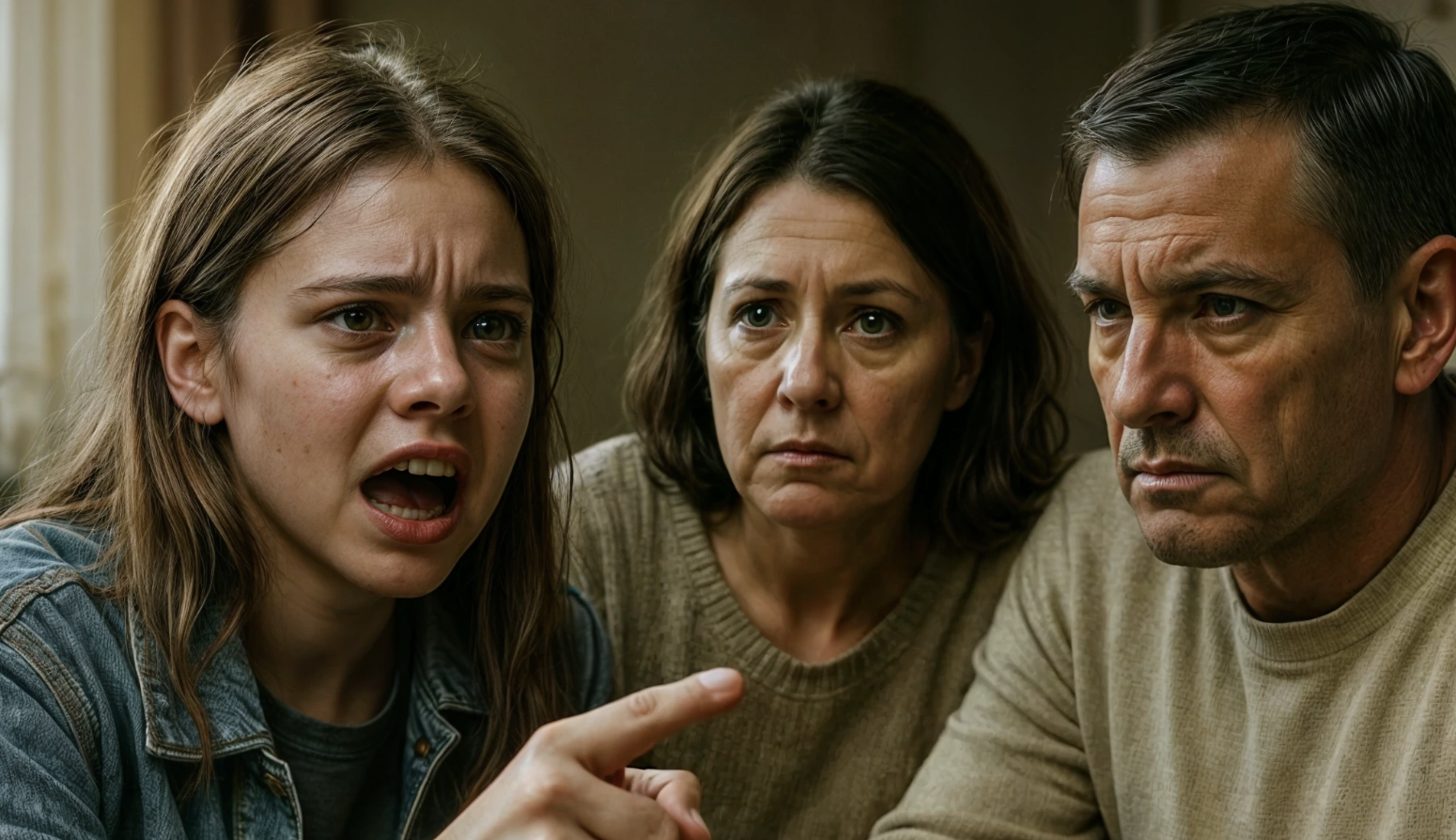— Why are you talking to me like that, Tanya? — Galina Yevgenyevna asked sharply, though her voice betrayed her agitation.
— Mom, how do you think I should talk? I’m not living at a resort here, I’m working day and night to achieve something. And where have you all been all these years?
— Now, now, there’s no need to shout at me. Maybe your father and I didn’t write often, but we knew you were doing fine. Besides, Vyacheslav needs help…
— Uh-huh, Vyacheslav—as always, everything, and me—a call saying ‘Hi, long time no talk, send some money’? Or what?
— Don’t twist my words, — Andrey Mikhaylovich interjected — Tanya, we’re not enemies…
— Not enemies? Really, Dad? You disappeared for eight years, and now you suddenly need me?
And Tanya abruptly ended the conversation. She stared at the phone screen, trying to comprehend what had just happened. Her head felt hot, and her heart pounded loudly.
Tanya was eighteen when she packed a small bag and bought a train ticket to Karaganda. Just the simplest third-class compartment, money barely earned from various odd jobs—and no airs about it. At that time, her parents were seeing off Vyacheslav to yet another prestigious student program, where, in their collective opinion, he was supposed to shine. Aunt Nadya, her mother’s sister, in parting tossed a sarcastic joke about Tanya’s uneven front teeth and her “snub nose.” Whenever Aunt Nadya joked, Tanya always wished she could just vanish into the ground.
Since childhood, Tanya had been the inconspicuous appendage of her older brother. Vyacheslav, as was often said, “showed promise” in sports, music, studies—in anything, as long as their parents could exclaim with admiration, “Look at how talented he is.” And Tanya, a girl with big, uncertain eyes and an imperfect smile, was frequently jerked aside and told not to interfere.
“Don’t get in the way,” her mother would say.
“Better go read or help with the dishes,” her father added.
Tanya genuinely tried to please them, but each time she felt that she was looked upon with contempt—as if she had failed to produce yet another wunderkind.
At fifteen, Tanya accidentally saw a documentary on plant breeding on television. She stared at the screen in fascination, unable to look away: vivid images, experiments, greenhouses, genetic engineering. For Tanya, it opened the door to a new world. However, the path to her dream was not easy: no one wanted to buy specialized books for her, nor did they support the idea of her enrolling in the biology faculty. Her parents were forever occupied with the achievements of her brother, who would sometimes win a chess tournament and other times dazzle at academic olympiads. A “failure” of a sister was of no interest. Aunt Nadya regularly made remarks:
“Tanyukh, who needs your little flowers? I mean, when someone goes to law or finance, that makes sense. But this is all just playing around.”
Tanya harbored a cherished desire—to get far away, so as not to hear these ironic “Tanyukh” jibes and the discussions about the futility of her hobbies.
So after finishing school she decided: enough is enough. The clatter of train wheels, the station, an unfamiliar city. A university dormitory in Karaganda, new friends. In the first six months, she sent home only two brief messages—to announce her admission. The reply was curt: “Alright, take care. Your parents.” Then the contact ceased on its own.
At the university, Tanya almost immediately chose the genetics department and began researching the disease resistance of vegetable crops, working as a lab assistant at the same time. After graduation, she was retained as a graduate student, where she quickly achieved significant results. A couple of her experimental projects on plant DNA modification impressed the scientific community, and the day came when sudden popularity knocked on her door: she was asked to give an interview about the life of a young scientist on a federal TV channel. Along with that, a solid grant was offered, and the university provided a spacious laboratory for her research.
“Tanya, you’re really a smart one,” said her colleague and friend Olesya, when a flushed Tanya returned from the TV studio. “It’s nothing short of a miracle!”
“Yeah, I’m in shock myself,” Tanya laughed, still not believing the reality of it all. “They told me that if everything continues successfully, we can start large-scale trials. And then, who knows, it might be useful not only in Kazakhstan…”
“Just don’t get too full of yourself, alright?” Olesya winked in a friendly manner.
“Oh, come on,” Tanya wrinkled her nose. “I was raised to know that I was just an insignificant appendage to my older brother—there’s no way I could be a star.”
A few days after the interview, Tanya’s phone practically exploded with calls from unfamiliar numbers, including some from the capital. The first call was from her mother, Galina Yevgenyevna. Tanya answered:
“Tanyusha, hi, it’s Mom. I heard that you now… oh, I don’t even know how to say it—probably well done! Don’t go off the grid. We saw you on TV, can you imagine?”
“Hi, Mom. Yes, there was an interview.”
“And how are you anyway? Slava has completely lost it,” Galina Yevgenyevna suddenly whispered. “I don’t know what to do with him. We need to talk; maybe you could come over and advise us on something?”
“Mom, I’m really busy at work right now.”
“You’re famous now, surely you can use your connections, maybe even talk to Vyacheslav like an adult? I mean, perhaps he needs money or some advice. He’s been… well, off on his own lately.”
“I understand,” Tanya said in a controlled tone, trying to keep her voice steady. “But I’m not planning on leaving Karaganda, sorry.”
“We all miss you so much here,” her mother’s tone brightened. “Come back home; after all, we’re family. Your prospects are so good now that it would be more convenient in Astana!”
“I’m not thinking about that right now, Mom.”
“Well, see for yourself… But you’re still one of us. Come, at least see your dad; his health isn’t great. And Aunt Nadya is asking how you’re doing.”
Mumbling something unintelligible, Tanya said goodbye and hung up. She didn’t tell her mother what was really in her heart: a suppressed resentment, surprise, cautious curiosity. Everything was flooding in at once.
The next day, Aunt Nadya called via video link:
“Tanyukh, hi! You’re something else—I saw you on TV! They showed those garden beds and all that smart, scientific stuff!”
“Hello, Aunt Nadya…”
“Just call me Aunt, why have you become so formal? I thought maybe you did the right thing by leaving. After all, you did better in Karaganda than you could at home. And we all used to think… oh, never mind what we thought. Overall, I’m proud of you, dear. And I see you even straightened your teeth? Oh, beauty!”
“Yeah, had to,” Tanya smiled, though the unpleasant memory of her aunt’s long-ago jibes pricked her heart.
“Listen, come visit us. Now that you have money, everything must be fine, right? Your mom and I already pictured your career taking off. And your little brother still hasn’t found his way… We’re getting old, Galina Yevgenyevna and I thought Slava would support us, but he just doesn’t.”
“I understand,” Tanya repeated almost automatically. “Okay, Aunt, I need to run to the lab.”
After disconnecting, she slid off her chair onto the floor and sat there for a while, hugging her knees. Inside, contradictory feelings churned. For eight years no one had even called just to check if she was alive, well, or had enough money for life. And now there was a flood of interest, pride, and suggestions to come back closer to their ‘problems.’
A week later, a call came from her father, who decided to remind her of his existence too:
“Tanya, hello, it’s Dad.”
“Hi, Dad.”
“I wanted to talk. Maybe you could come for a couple of days? We’ve got a lot going on, and… you see, everyone got all worked up when they heard about your success. We’re genuinely happy. But Vyacheslav is in a difficult situation right now; your help might do him some good.”
“My help? What can I do?”
“You’re famous now; maybe you have connections? Could you advise him on finding a job somewhere? He’s not dumb, he just hasn’t figured life out yet.”
“Dad,” Tanya smiled wryly, “I don’t even know what to say.”
This avalanche of demands and insinuations that Tanya should solve other people’s problems became unbearable. A sense of resentment and bitter memories surged. She didn’t want to lose her temper, but continuing was impossible.
The next day, while Tanya was in her laboratory, another call from her mother came through; Olesya gestured, “Answer it, or they’ll pester you!” Tanya sighed and put the call on speakerphone.
“Mom, I’m at work, so speak quickly.”
“Tanyusha, there’s something…,” Galina Yevgenyevna began, and from her tone it was clear she was about to share a complaint. “Vyacheslav has again fallen behind on his rent, and your father and I can’t help him. All our funds are now going to his treatment, and you know—life is expensive these days. Maybe you could…”
“Mom?” Tanya interrupted, leaning on the edge of her desk and gathering her thoughts. “Am I to understand that you all suddenly think I’ve turned from a forgotten ugly duckling into an ATM or a lifesaver?”
“How do you put it, Tanyusha? We are your parents.”
“Parents.” Tanya sighed. “And do you think I care about your problems after not hearing from you for eight years?”
“You’re being unfair, dear,” her mother’s voice trembled. “You left on your own!”
“Yes, I left. And it was the right thing to do. Back then, you didn’t give a damn about me. I was unwanted.”
“Then why are you saying that, Tanya…”
“Mom, let’s be honest. You’ve always treated me as if I were nothing, and rightly so, because I will always be nothing to you. Don’t call me again, goodbye!”
Tanya ended the call abruptly, and in the laboratory there was a brief gasp. Several colleagues awkwardly averted their eyes, trying not to interfere in someone else’s family drama, but everyone had heard the final words. Olesya, who was sitting closest, leaned toward Tanya:
“Listen, maybe you’re overreacting… after all, they are your parents…”
“No, Olesya,” Tanya replied, “It’s… it’s been broken for a long time.”
Tanya pretended to continue her work with the test tubes, though her hands trembled slightly. Inside, there was not the slightest desire left to soften, explain, or return. She had come a long way from being that little girl who was unwanted to an independent scientist with her own voice. And now that voice had finally sounded loud and clear. And let those who never noticed her continue to live with the knowledge that she wasn’t going to shoulder other people’s problems.
She looked at her phone again: there were missed calls from her aunt, father, and mother. But Tanya wasn’t planning on calling back. For her, it was perfectly clear: no relatives who only just remembered her now could be more important than her own life, her scientific dreams, and the people in Karaganda who had truly been by her side all along.”



